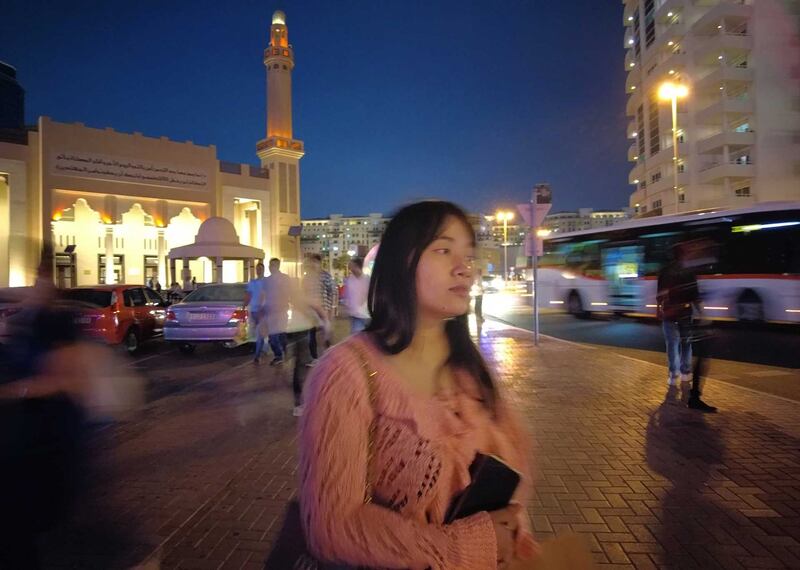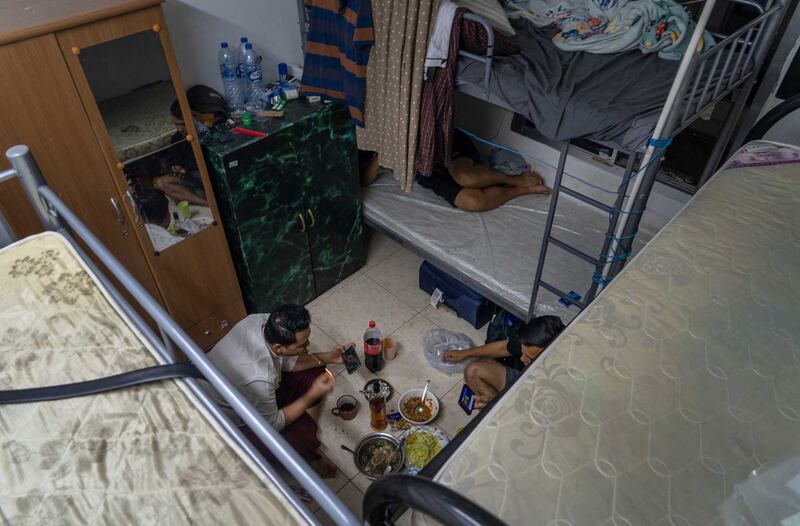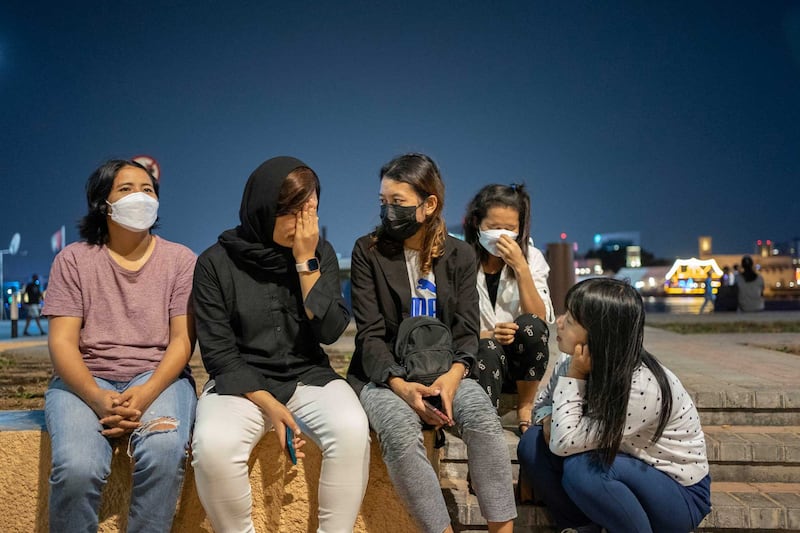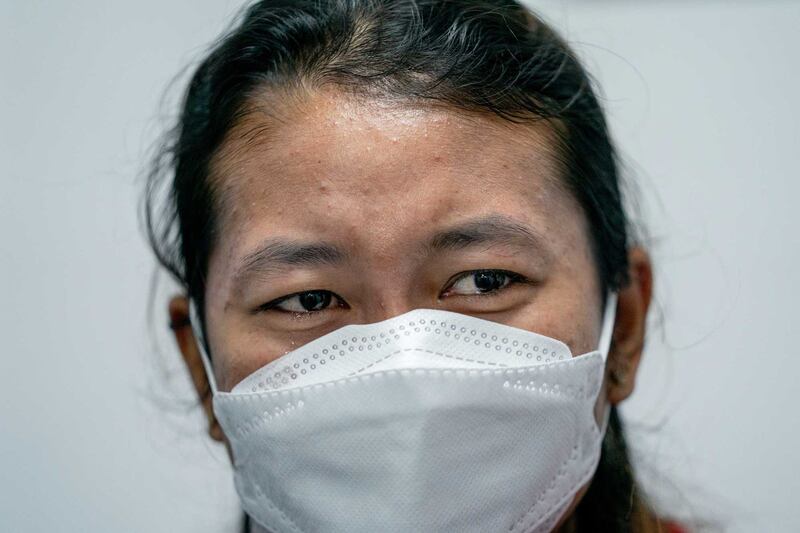Forced to flee her Magway village in southeast Myanmar during a junta attack, Theingi Soe spent a “terrible” month living in makeshift shelters in the jungle during the rainy season. In her misery, she began to plot another escape – to a life in a country beyond the conflict.
An acquaintance put her in touch with a hiring agent in Yangon who promised work in Dubai. She paid 1 million kyats (U.S. $476) upfront to be connected to a family in need of domestic help, bought her own plane ticket, and arrived in her new home on Dec. 26, 2021, nervous but hopeful she would find a measure of stability among the city’s gleaming high rises and shining shopping malls.
Instead, Theingi Soe, 27, says she has been confronted with new hardships: denied wages she had been promised in Myanmar; forced to work 16-hour days on just one meal a day; “sold” from one unscrupulous broker to another, her “debt” rising with each purchase.
Back home, “we had to run for our lives,” Theingi Soe said in a soft but steady voice. In Dubai, she said she has felt “sad and helpless.” When Theingi Soe feels her most alone, she sits along the shoreline of Dubai Creek, looking across the water to the city’s historic district and the Burj Khalifa, the world’s tallest building, beyond.

Theingi Soe is part of an exodus of workers from Myanmar since the military coup in early 2021 engulfed the country in chaos.
In 2020, 3.7 million people from Myanmar were working abroad, about 37% of whom were women, according to the United Nations. More precise figures are not available, but at least another 70,000 people have fled since the military takeover from an democratically elected government, according to the U.N.
Each day, young women arrive on direct Myanmar Airways International flights from Yangon to Dubai, a city whose glitz and glamor relies on foreign workers. Theingi Soe's family runs a small mill in Magway but fighting in the area has hurt the business. She hoped her job in Dubai would help offset some of the lost income.
In some cases, the women find stable work environments that pay more than they could hope to earn in Myanmar, where poverty and inflation both rose under the dual pressures of COVID and post-coup fighting.
But many other women find they must navigate a disorienting environment of abuse, with little support from a military junta back home struggling to consolidate power.
Theingi Soe got a hint that the reality of her new home might not live up to her expectation shortly after her arrival. She and six other women touched down in the early morning and were put in a single room at the hiring agency. The six had to share a single blanket.
A month passed before she was finally placed with a family – for 1,200 dirhams a month ($326), not the 1,500 she’d been promised. Raised in a more open Myanmar where women had gained more rights and had ready access to the internet, Theingi Soe said she demanded to be paid what she had been promised.

“They said I have to reimburse 3.8 million Myanmar kyats for returning. That was ridiculous. I had just arrived. And I paid for my trip. Why would I have to reimburse?” she said in a voice that’s clear and direct.
“I told them I wanted to return. I had to cry and weep then. I don’t have freedom to make my own choice in Dubai.”
What followed was a year-long struggle in a system that didn’t give her a chance to choose where she wanted to work. Agents from Dubai, Myanmar, Ethiopia, the Philippines and other countries purchase the rights to migrants like Theingi Soe from other agents, each transaction raising the money they “owe” to have their passports and other identifying documents returned.
News reports have documented widespread problems involving female migrants from poor countries across the world working in the Middle East. In 2015, Jakarta banned female workers from traveling to Saudi Arabia and other Gulf countries after years of reports of abuse, although the practice continued.
The World Cup has raised new questions about the conditions migrant workers labor under. Qatar, which hosted the soccer tournament, recently said that as many as 500 migrants died during construction of stadiums and other infrastructure for the tournament. Officials later said the figure included infrastructure projects not related to the tournament. But Amnesty International, the human rights group, said in a 2021 report that thousands of young migrant workers had died in Qatar over the past decade, though not necessarily from work-related accidents on World Cup projects.
Despite the risks, the promise of higher wages with little schooling or experience remains an almost irresistible opportunity for many workers from poorer countries, says Kathleen Newland, who co-founded the Migration Policy Institute, a Washington-based group that advocates for migrant worker rights.
“We hear plenty of stories about these women not having their own rooms, having to sleep in essentially closets or in the kitchen, being on call 24/7, and being subjected to physical and sexual abuse by male members of the household,” Newland said. “It's a pretty grim picture.”
Countries including the Philippines have sought to provide more in-country services to their citizens overseas through shelters after well-documented cases of abuse surfaced. Those changes have led brokers to seek migrants from countries that pay less attention, including Myanmar, Newland said.
Calls to the United Arab Emirates Embassy in Washington were not returned. Dubai is part of the UAE.

In September, RFA received Facebook and WeChat messages from several women, including Theingi Soe, who said they were being exploited in UAE and Oman. In November, RFA reporters traveled to Dubai to interview the women and other migrants.
The women came from all parts of Myanmar – ethnic border regions where clashes with the military have been particularly fierce to city centers where factories have closed in the economic downturn.
They shared similar stories of long hours without breaks and little to eat, crowded dormitories, and in some cases physical abuse at the hands of host families. Each woman said the agent in Dubai took her passport, a practice that the United Nations’ International Labor Organization calls abusive because it restricts migrants’s “freedom of movement and consequently increases their risk of becoming victims of forced labor.”
Some of the women RFA spoke with said they have sat around for weeks, unemployed and unable to make money despite having paid hiring agents on the promise of work. They were in an uneasy holding pattern with too little money to pay to get their passports back and return home.

Ei Nge, 24, came to Dubai from Lashio in Shan state in northern Myanmar on a promise from the hiring agent that she would be provided with “sufficient food and sleep.” She said she received neither, and her expected pay of 1,200 dirhams turned to only 900 when she started working.
Worse was the physical abuse she says she suffered in her first house. Tall and thin with long black hair, Ei Nge shrinks a little when she talks about the time her employers accused her of using a phone and beat her, leaving marks on her arms and hands still evident two weeks later. She says she was struck with an iron by the woman who employed her and the woman’s husband pushed her down stairs.
“The children bullied me too,” she said quietly as her eyes filled with tears. “When I told my agent about that, they said I should just put up with it because they were just children.”
Htay Htay Myint, 26, left her home in the Sidoktaya township in the Magway region hoping to work at a factory in Yangon but discovered that it had closed. A broker suggested she move overseas and connected her with an agent in Dubai who promised work for the price of her first two months’ salary.
Once in Dubai, however, it took five months to find a job. She lasted a week with her first family, who she said required her to work from dawn to early the following morning.
“That’s why when I told my agency that I wanted to return to Myanmar, they asked me to reimburse them. I don’t have the money to.” She said the agency says she must pay 12,000 dirhams, ($3,200) to get her passport back.
Sheen Ree Naing, 24, from Falam township in Chin state in western Myanmar, was working for a Dubai family when health issues forced her to quit. Her agent in Dubai demanded $2,000, an astronomical sum, to return her passport. The woman she was working for told her not to make the payment because she had already paid for Sheen Ree Naing’s travel expenses.
“I ran because they kept me in a dormitory where I could not contact my family and did not get enough food,” she said.
Ei Nge said that the Myanmar broker who set up with an agent in Dubai reimbursed the 12,000 dirhams the agent said she owed. She has since returned home.

After earlier reports by RFA Burmese service, military officials arranged for a group of female migrants to be flown home. But the regime’s repressive policies have disconnected it with NGOs and other groups that make up an infrastructure of support for foreign workers. The junta is also less capable administratively compared to the former civilian government, leaving the women to turn to an ad hoc network of Burmese diaspora for help.
One of the people the women turn to is Nwe Ni, whose welcoming face tightens with concern when she discusses the difficulties female migrants face.
Nwe Ni, 36, grew up outside of Yangon but came to Dubai to work as a maid shortly after the coup. She said she was also cheated out of wages in the first few months after her arrival but eventually found work at a reputable agency, where she now helps train new arrivals find safe environments to work and live.
“We take care of them as much as we can,” Nwe Ni said.
She let Ei Nge, Htay Htay Myint and Moe Moe Aye, 39, a migrant worker from Kyonpyaw township in the Irrawaddy region who also says she was beaten by her employers, stay with her after the three had run away from their agencies.
Another resource for the women is a Facebook page, Myanmar in UAE, that now has more than 47,000 members. On it, members trade information about rooms to rent or places to eat. Page administrator Htoo Htet Paing, who works in real estate in Dubai, has helped negotiate settlements between migrants and agents, and recently posted a list of certified agencies that are less likely to exploit workers.

The women also rely on one another for support, holding hands as is custom in Myanmar as they walk among the desert-brown hotels and apartment complexes in the Deira neighborhood where migrants from around the world live.
Since the coup, the regime has clamped down on dissent, imprisoning, torturing and killing civilian protesters and members of the ousted civilian government. Military leaders have shut off access to the internet in restive regions, and threatened workers participating in a mass strike in protest of the military takeover.
But the migrants RFA interviewed grew up in a more open Myanmar when the long-ruling military shared power with an elected government. Citizens were able to access the internet, a nascent free press sprang up, and women gained more rights.
Fleeing the turmoil, Theingi Soe came to Dubai with a few clothes and an independent streak. She was told she would only have to clean for the first family who hired her, but ended up also having to babysit and cook. She said she worked long days with no breaks and little to eat.
“I planned to stay humble, work hard for my host and go home after two years,” Theingi Soe said.
But after two months she says the first family kicked her out, unhappy with her work. Her second employer refused to let her use the Wi-Fi in the house, leaving her cut off from her relatives and friends in Myanmar and adding to her sense of isolation.

Not someone to quietly accept her fate, Theingi Soe asked her agent to find her a new job but was refused. It was another two months before her hosts granted her request to leave. Next she says she was sent with a friend from her village to what she thought was a new family in Abu Dhabi but instead was another agency.
In all, Theingi Soe said she worked in five houses for wealthy Arab families and was transferred between three agencies. An Abu Dhabi agent refused to return her passport unless she paid 12,000 dirhams – the price the woman had said she paid for both her and her friend, Theingi Soe said.
“They just sold us to whoever paid the money,” she said of the agents. “That’s what they only care about: the money.”
Having gone to Dubai to help her family, Theingi Soe has instead had to rely on them for support. Her parents borrowed money from a relative in the village at a 4% interest rate (per month) to help her get her passport. Htoo Htet Paing, the Facebook page administrator, helped to negotiate its return.
By necessity, Theingi Soe’s focus is on money too and earning enough to repay her family’s loan. Before the coup, her parents pressed oil from the peanuts and sesame seeds cultivated on farms near her village. But the business has since collapsed because farmers haven’t been able to produce crops due to fighting in the area.
Now Theingi Soe, whose upbeat personality has survived the difficulties she’s faced, hopes she’ll find a good family to work for and leave her recent struggles behind. She wants to renew her visa but an agent has filed a case against her for breach of contract, a dispute that will have to be resolved if she wants to work legally in the country.

